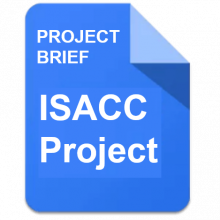ISAAC Project Brief
PIC governments are taking proactive steps to address climate change priorities through the development of national climate change policies, joint national action plans, integrating climate change and disaster risks into sector policies, and through the establishment of national climate change coordination and disaster risk mechanisms. Whilst PIC governments have taken an active role in progressing national and regional climate change priorities, challenges persist in terms of human capacity constraints in central climate change, finance and planning agenciesto develop and manage multi-sectoral climate change projects and programmes and access global climate change finance; gaps with linkages between central climate change, finance, planning and key sector ministries due to fragile or lack of institutional arrangements and enabling policies to facilitate cross sector collaboration and shared learnings.This results in fragmented approaches which affect coordination and communication and further results in the slow implementation of climate change policies, plans, projects and programmes.The project will build on the Pacific Climate Change Finance Assessment Framework1 (PCCFAF), which was developed by the Pacific Islands Forum Secretariat (PIFS) in 2013 and applied to national climate change finance assessments in Nauru (2013), RMI (2014) and Tonga (2015); and a complementary methodology known as the Climate Public and Expenditure Institutional Review (CPEIR)2. The project will facilitate knowledge sharing and capacity building between PICs through peer to peer exchanges which has proved successful under the Forum Compact arrangements. Under the Forum Compact work on development effectiveness supported by the PIFS, the peer to peer exchanges involved the ministries of finance in Samoa and Cook Islands hosting and mentoring country officials from the Solomon Islands, FSM, and RMI on development effectiveness principles. It is envisaged that such an approach would prove equally beneficial for the climate change, finance and planning officials that would be identified through this project. The project will build on multi-sector, outer island approaches/programmes to strengthen outer island resilience and linkages between local/provincial and national governments. These approaches have been piloted in Kiribati under the Whole of island Approach and in the Solomon Islands under the ‘Choiseul Integrated Climate Change Programme or CHICCHAP’
Files
Document Tabs

